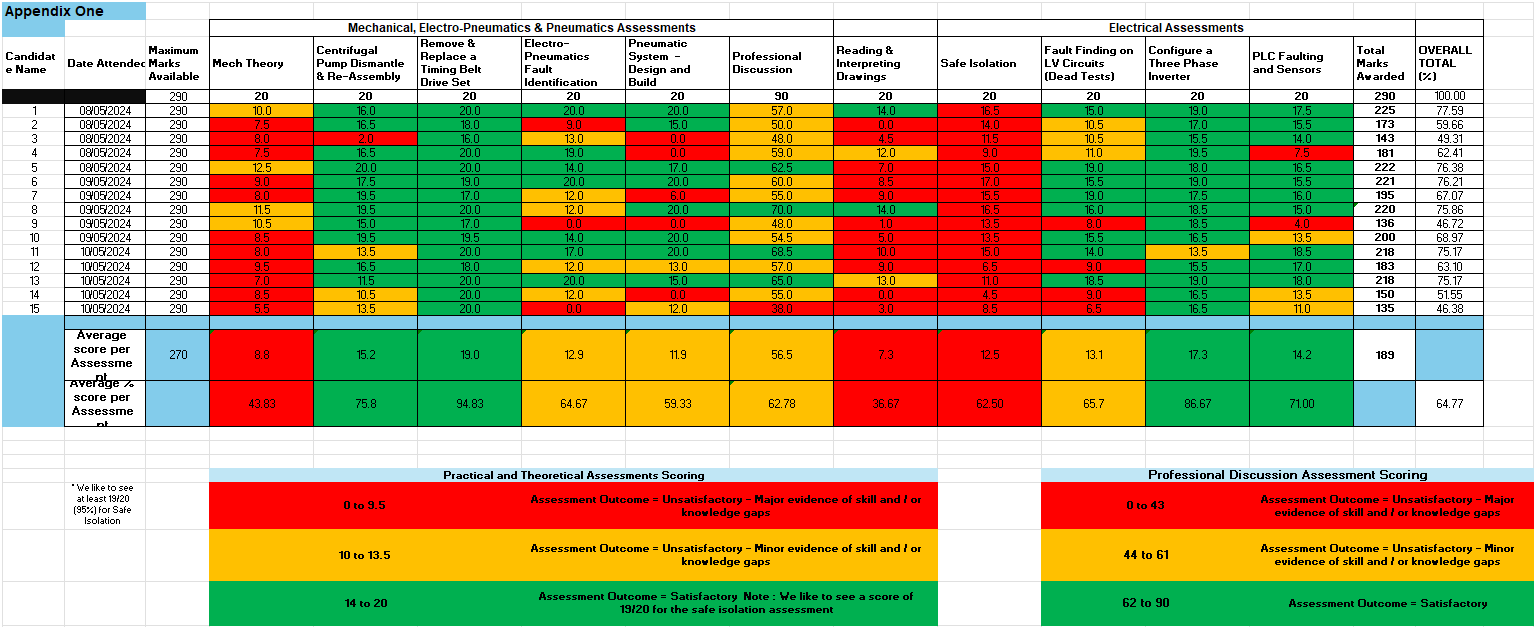Discover Your Skills Gaps with Maintenance Development Centres
As the manufacturing industry evolves and the demands on your team increase, how can you ensure that your technicians are equipped with the right skills and remain engaged? It’s time to explore fresh, innovative solutions that will not only enhance skills but also boost retention and workplace safety.
The Challenge:
Skills Gaps and Workforce Retention
Manufacturing organisations often grapple with skills shortages and high employee turnover. As experienced technicians retire, finding qualified replacements can be a daunting task. Moreover, the financial implications of onboarding and training new hires can be significant. How do you mitigate these risks while maintaining operational efficiency and productivity?
Skills Assessment and Engagement
At MCP Technical Training, we offer a holistic solution that merges advanced skills assessment with effective retention strategies. Here’s how our unique approach can revitalise your maintenance operations.
Example of Maintenance Development Centre scoring.
The image above illustrates a sample report from a recent Maintenance Development Centre assessment, designed to help our customer identify their maintenance organisation’s strengths and areas for improvement.
As part of a Maintenance Development Centres, we provide extensive competence assessments and trade tests, customised to meet specific requirements. The qualitative and quantitative data we gather offers deep insights into a business’s needs, enabling them to invest strategically in technical training and other support services. With a clear understanding of a workforce’s capabilities, informed decisions can be made to drive organisational success.
Findings:
With our consultants' expertise, we were able to determine the needs of the workforce for the client. The graph above provided us with the necessary data to help assess what training programmes our customer will need to maximize their current workforce efficiency:
2 x Basic Electrical Skills for Mechanical Engineers (Mech to Elec Conversion)
4 x Reading and Interpreting Electrical Drawings
2 x Inverter
4 x Logical Approach to Fault Finding and Root Cause Analysis
4 x Pneumatics
On-Job vs Off-Job Training
It is important to understand that for those who have learned on the job, rather than through off-job study, there is a need to gain deeper understanding and theoretical knowledge, as this will aid in fault-finding and continuous improvement. This theoretical knowledge can only be effectively acquired through off-job courses.
However, on-job training should follow off-job courses. This is critical for developing practical skills and overall competence. We suggest that all off-job training include a competency assessment as a sign-off and that it be followed immediately by on-job practice, supported by more experienced engineers. This practice should be recorded and monitored over a period of at least six months to ensure that the skills are properly embedded and not lost due to lack of use.
Practical skills were observed to be stronger than theoretical skills. However, weaker theoretical knowledge or underpinning concepts will lead to slower fault rectification and incorrect or delayed root cause analysis.
Key Benefits of Our Assessments:
Formal Evidence of Competence: We provide documented proof of each technician's skills, allowing for informed decisions about training and development.
Notification of Training Needs: Our assessments identify specific training requirements, enabling proactive skill gap management.
Third-Party Validation: Evaluations are conducted by experienced assessors, ensuring impartiality and reliability in the results.
Enhancing Safety and Performance
Investing in training based on assessment findings leads to significant improvements in safety standards and overall staff performance. Our approach results in Improved Safety Standards by providing technicians targeted training that enhances their understanding of safety protocols, reducing the risk of incidents.
Another key important benefit is the Elevated Team Performance created by conducting post-training evaluations that show measurable uplifts in maintenance team effectiveness and efficiency. You will also notice Increased Technician Motivation as engaged and skilled technicians are more likely to feel motivated and committed to their roles.
Recruitment Process
A Maintenance Development Centre is instrumental in streamlining the recruitment process for competent maintenance staff. By providing a structured framework for evaluating candidates, it allows organisations to assess specific skills and competencies required for maintenance roles effectively. For instance, when a large distribution centre needed to hire dozens of technicians with specialised skills, the Development Centre facilitated targeted assessments that identified the most qualified candidates while minimising skills gaps. This approach not only enhances the quality of hires but also ensures that new technicians are equipped to meet the operational demands from day one.
Mark Everson, Technical Trainer for MCP Technical Training explains why businesses should carry out Maintenance Development Centres on their technicians.
Ready to Transform Your Workforce?
Choosing our Maintenance Development Centres, means addressing immediate workforce challenges, while laying the groundwork for a more skilled, safe, and motivated maintenance team. Our customised assessments and training solutions empower your technicians and propel your organisation forward.
Don’t leave your maintenance operations to chance. Contact us today to discover how our tailored assessments can unlock the full potential of your technical team.






